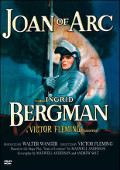
Directed by
Victor Fleming
145 minutes
Rated PG
Reviewed by
Bernard Hemingway

Joan Of Arc
Victor Fleming's final film, a lavish but ponderously pious account of one of the most famous women in history looks forwards to the grandiose style of the religious epics so favoured by Hollywood in the 1950s and ‘60s (at the time of his death from a heart attack in January 1949, Fleming was planning to film The Robe, which was made by 20th Century Fox in 1952).
Although the film flopped in its day due to the scandal that broke when Ingrid Bergman started a public affair with Roberto Rosellini, the main problem with it today is its evident fakery, clearly having been shot on Hollywood sound stages with matte paintings standing in for French landscapes and a roster of largely American actors (English actor Francis L. Sullivan as the dastardly corrupt Bishop Pierre Cauchon being a notable exception) playing medieval Frenchmen without a whit of credibility (Ward Bond in armour is a sight to behold). That it seems to preserve much of the stage dialogue from Maxwell Anderson’s play "Joan of Lorraine" only compounds the problem giving the production a stilted quality that is aggravated by Hugo Friedhofer‘s syrupy score and the intensely saturated Technicolor palette. That Bergman was in her mid-30s when playing a supposed 19 year old does nothing to alleviate the sense of incongruity between the production's style and its aspirations.
Couched very much in the manner of Christian martyrology in its first half the film is big on gauzy imagery of the young maiden and her self-avowed mission to crown the Dauphin (José Ferrer in his first screen role) by booting the English and their Burgundian allies out of France in a holy war. How this came to be historically is facilely passed over in the general drive to demonstrate Joan’s saintliness but because of the production's overall gimcrackery she often comes across as more seriously delusional than divinely-inspired. It is a little stronger in its latter section which deals with Joan’s tragic betrayal and execution by the self-interested powers-that-be but by this time it’s only really playing out what we all know from the get-go to be a foregone conclusion.
Joan of Arc is big on pageantry (it won Oscars for Best Color Cinematography and Costume Design) and sentimental religiosity but these are not qualities that cut the mustard these days.
Want something different?





